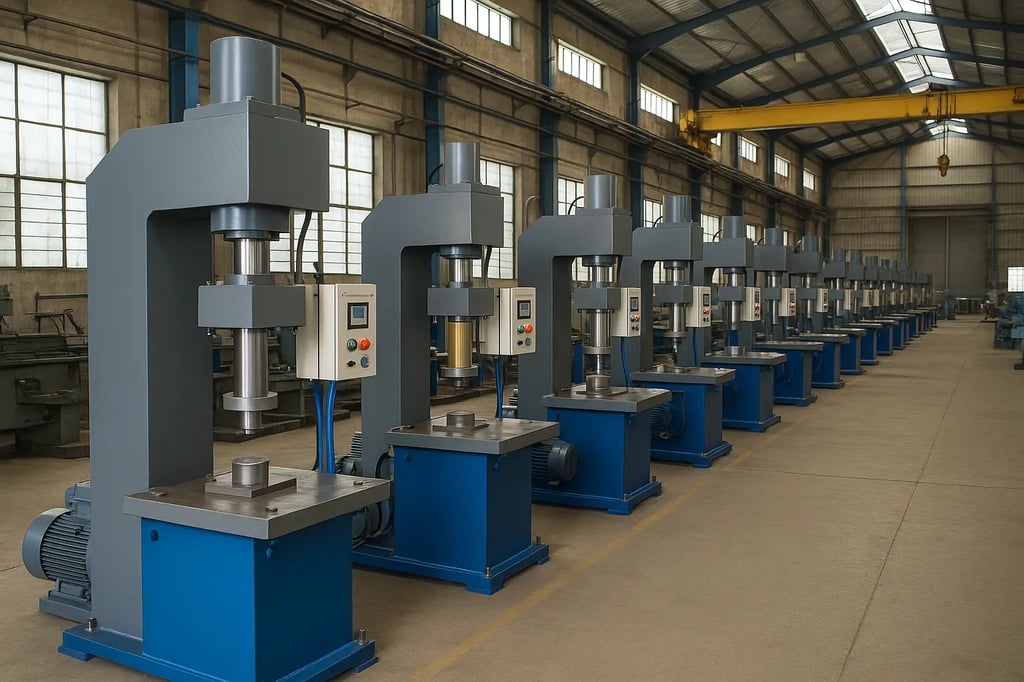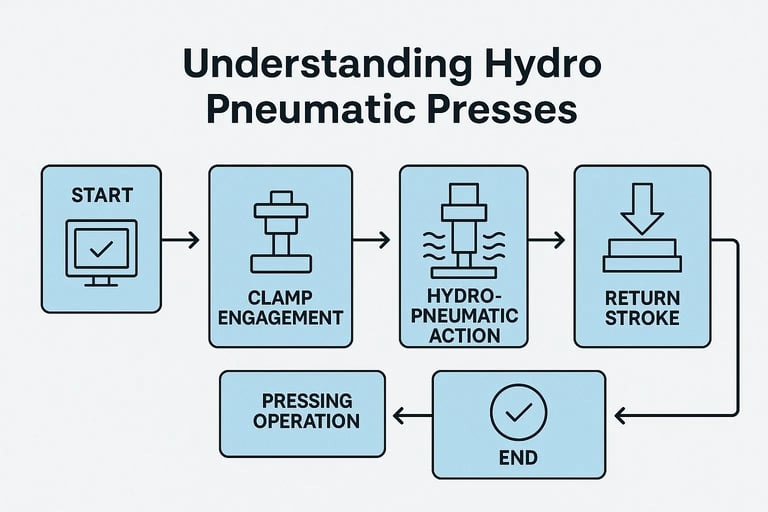
Why Hydro Pneumatic Press Machines Are Replacing Hydraulic Systems in Modern Manufacturing
Discover why forward-thinking industries are making the switch — and how it’s boosting their productivity while cutting costs.
NationalPneumaticsystem
5/22/20253 min read


Introduction
For decades, hydraulic presses have powered heavy industrial tasks — from metal forming to component assembly. But today, a smarter, faster, and more energy-efficient alternative is rapidly gaining ground: the Hydro pneumatic press machine.
This hybrid technology — combining the speed of pneumatics and the force of hydraulics — is helping industries reduce energy costs, optimize cycle times, and increase output.
Let’s explore why manufacturers across India and beyond are switching to hydro pneumatic presses, and why you should too.
⚙️ What is a
A hydro pneumatic press is a machine that:
Uses compressed air for fast, lightweight movements.
Uses hydraulic oil only when higher force is required.
Offers faster cycles than hydraulic systems.
Delivers precise force control without overheating or leakage.
Hydro Pneumatic Press?
Traditional Hydraulic Press Problems:
High oil consumption
Overheating with continuous use
Slower cycle speeds
Expensive maintenance
Top 5 Reasons Hydro Pneumatic Presses Are Winning
1. Speed Without Compromise
Hydro pneumatic presses achieve much faster operation cycles compared to traditional hydraulic systems — up to 30–40% faster in many cases. This is ideal for mass production.
2. Massive Energy Savings
Unlike hydraulics, these presses only use air until pressure is needed — reducing power consumption by up to 50%, making them greener and more cost-effective.
3. Compact Design = More Space
No need for large hydraulic tanks or complex valve blocks. Hydro pneumatic units are compact and can be installed on smaller shop floors — perfect for SMEs and startups.
4. Minimal Maintenance
Fewer moving parts and less oil usage means lower wear and tear, no oil leak issues, and lower downtime.
5. Customizable Force Control
With dual pressure stages, you get:
Light pressure for movement
High pressure for final press
This precision is ideal for delicate components in electronics, automotive, and packaging industries.
🔧 Real-World Use Case: Aluminium Casting Units
Hydro pneumatic presses are now widely used in aluminium casting units for:
Deburring
Trimming
Mould ejection
They offer fast response time with just the right amount of pressing force — reducing rework and improving safety.
📊 Cost Comparison: Hydraulic vs Hydro Pneumatic
Feature
Hydraulic Press
Hydro Pneumatic Press
Cycle Speed
Fast (30% faster)
Slow
Energy Consumption
High
Low
Maintenance Cost
High
Low
Oil Requirement
100% operation
Partial operation
Initial Setup
Heavy, complex
Lightweight, compact
Who Should Read This?
Production Managers
Maintenance Engineers
Procurement Heads
Industrial Automation Consultants
If you're involved in automotive, electronics, plastics, or casting — hydro pneumatic presses can dramatically improve your operations.
🏆 Why National Pneumatic Systems?
At National Pneumatic Systems, we’ve been crafting hydro pneumatic press machines and cylinders in Vasai since 2006. Our machines are:
ISO-grade certified
Custom-built for each client
Energy-efficient & operator-friendly
Supported PAN India
📞 Ready to Upgrade?
Thinking about switching from hydraulic to hydro pneumatic?
We offer a free consultation to help you select the right press for your needs.
📩 Contact us here: https://nationalpneumaticsystems.com/contact-us
Final Thoughts
Hydro pneumatic presses aren’t just a trend — they’re the future of precision manufacturing. Whether you're upgrading your factory floor or starting fresh, this technology offers speed, efficiency, and long-term savings that hydraulics simply can’t match.


National Pneumatic Systems
Unit No.10,23,24,28,29, Dewan & Shah, Industrial Estate No.04, Navghar Rd. Vasai(E) Palghar 401210
GSTIN/UIN: 27AAFFN9356B1Z7
© 2025 National Pneumatic Systems. All Rights Reserved.
Quick links
Products
Hydro pneumatic presses
Hydro pneumatic Cylinders
Managed by :
